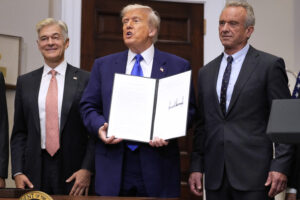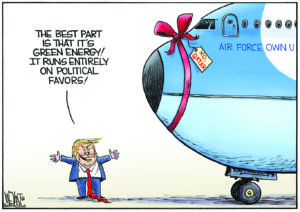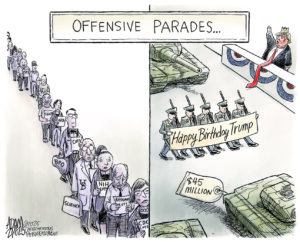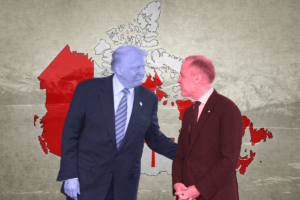Politicians and Pundits Weigh In on James Comey’s Testimony (Video)
Sen. Lindsey Graham and Rep. Adam Schiff disagree about how the former FBI director’s testimony will affect the president.Update (12:48 p.m. PDT): For the average American, the 2018 midterm elections may still seem a long way off, but for the average Capitol Hill denizen, media pundit or political junkie, chronological distinctions between campaign cycles have nearly disappeared. It’s all one long campaign.
So it should come as no surprise that even before James Comey took the proverbial podium on Thursday to testify before the Senate Intelligence Committee, Sen. Lindsey Graham, R-S.C., and Rep. Adam Schiff, D-Calif., were reading the tea leaves as to the potential relationship between Comey’s commentary and President Trump’s job security.
Both legislators aired their prognostications on “CBS This Morning” prior to Comey’s huddle in the Senate. Graham, who frequently has criticized the president, thought Trump would come through the other side of this current political firestorm relatively intact due to the fact that Robert Mueller allowed Comey to testify in the first place. Mueller is head of the committee investigating the Trump administration’s possible involvement in Russia’s alleged interference in the 2016 presidential election. According to The Hill:
“Unless Mueller is a complete idiot, which he is not, he’s concluded there’s no obstruction of justice case because if he had concluded otherwise, Comey wouldn’t be testifying,” Graham said on “CBS This Morning.”
“You wouldn’t let his chief and only witness go through this process if you believe you really had a case to prosecute. And Mr. Mueller is a good prosecutor,” the Republican senator added.
Schiff reached the opposite conclusion after considering the same evidence. The Hill reported:
“I would have to strongly disagree with my colleague Lindsey Graham. The fact that Bob Mueller is not worried about his testifying — I think that does not suggest anything about how Bob Mueller views the case,” Schiff also said on “CBS This Morning.” “Indeed, I would be astonished if he had a view this early in the investigation. Rather, I think it shows confidence that Jim Comey will be consistent in his testimony before the Senate and in any later proceeding. But I wouldn’t read any conclusion into that, one way or another.”
–Posted by Kasia Anderson
Update (11:03 a.m. PDT): After almost three hours of questioning, the public testimony of former FBI director James Comey came to a close. Politicians and pundits alike, however, were nowhere near finished with their analysis.
Speaker of the House Paul Ryan was quick to defend President Trump after Comey’s testimony painted a negative picture of the inexperienced president.
“The president’s new at this,” Ryan told reporters shortly after Comey’s testimony concluded. “He’s new to government.”
Watch his full remarks in the video below:
.@SpeakerRyan: “The president’s new at this, he’s new to government.” pic.twitter.com/j3LzBoxJ9n
— CSPAN (@cspan) June 8, 2017
Politicians and reporters shared their reactions to Comey’s public testimony on social media. Liberals largely focused on Comey’s decision to label Trump a “liar,” while conservatives lambasted the former FBI director for leaking information to the media.
Take a look at tweets from both sides of the aisle below:
We can all agree with Jim Comey that, Lordy, we hope there are tapes.
— Preet Bharara (@PreetBharara) June 8, 2017
#JamesComey laid out facts for Obstruction of Justice that even a first-time prosecutor could convict on with little difficulty.
— Ted Lieu (@tedlieu) June 8, 2017
That public hearing with James Comey was far more damning and detailed than I ever expected it to be. Wow.
— Shaun King (@ShaunKing) June 8, 2017
Today, former FBI Director Comey affirmed under oath that Mueller should have full independence. I agree, we owe it to the American people.
— Kamala Harris (@SenKamalaHarris) June 8, 2017
Comey found a lot of different ways to deliver one message: Trump is a liar https://t.co/2IZ71DEnL0
— Judd Legum (@JuddLegum) June 8, 2017
If there are indeed tapes of Comey’s conversations, they need to be preserved and made immediately available to Congress and Mueller.
— Adam Schiff (@RepAdamSchiff) June 8, 2017
“I was concerned that he would lie about the content of our meeting” says Comey of Trump. And never felt that way before.
— Amy Siskind (@Amy_Siskind) June 8, 2017
Today’s Winners: @realDonaldTrump
The DOW
America/#MAGALosers:
Comey
Loretta Lynch#MSM but especially NYT— Donald Trump Jr. (@DonaldJTrumpJr) June 8, 2017
Believe me, I’m sympathetic to Comey’s reasoning behind his leak. But General Petraeus tried the same argument; the .Gov was unpersuaded. https://t.co/hARYgSDvDm
— Edward Snowden (@Snowden) June 8, 2017
Comey just made it pretty clear Mueller is going to investigate obstruction of justice. A bombshell for the WH.
— Matthew Miller (@matthewamiller) June 8, 2017
Gangly James Comey admitted he leaked memos – which were official government property, not his, to get Special Counsel appointed. pic.twitter.com/tFwHe7o7yH
— Mike Cernovich (@Cernovich) June 8, 2017
Reminder: the President flat-out lied about asking Comey to lay off Flynn. Undeniable. Cut and dried.
— Christopher Hayes (@chrislhayes) June 8, 2017
—Posted by Emma Niles
Update (10:05 a.m. PDT): After questions from several more senators, the hearing is over. Below are some of the highlights from the second half of Comey’s testimony.
The former FBI head says he did not consider resigning after his encounters with Trump, though he had written a letter of resignation during the George W. Bush years over concerns regarding government surveillance.
Comey describes an awkward moment he shared with President Trump, saying, “I have a recollection of him just kind of looking at me … his body language gave me the sense like, ‘What am I gonna do?’ … He didn’t say anything.”
Near the end of the hearing, Comey insists that his firing is a “big deal,” saying: “It’s my judgment that I was fired because of the Russia investigation … the endeavor was to change the way the Russia investigation was being conducted. That is a very big deal. …”
Sen. Burr concludes the hearing, saying, “There’s still a lot of unanswered questions, and we’re going to get to the bottom of this.”
Update (8:45 a.m. PDT): Sen. James Risch seizes on the president’s exact words during the encounter in which he allegedly told Comey he “hope[d]” the former FBI director would “let go” of the investigation into former national security adviser Michael Flynn’s ties to Russia. Risch emphasizes the difference between expressing a “hope” and giving an order, to which Comey responds, “The reason I keep saying his words is, I took it as a direction. This is the president of the United States. I took it as a direction.”
Sen. Dianne Feinstein asks Comey whether he thought the Russia probe had anything to do with his firing, to which he replies, “Yes, because I’ve seen the president say so.” Comey also discusses the possibility of his conversations with the president having been recorded, as suggested by President Trump. According to Comey, Trump insisted that Flynn was a “good guy” as he stated his desire for the investigation on him to end.
“I saw the [president’s] tweet about the tapes,” says Comey. “Lordy, I hope there are tapes. I remember saying ‘I agree he’s a good guy,’ as a way of saying ‘I’m not agreeing with what you asked me to just do.’ ”
Sen. Marco Rubio focuses on Comey’s actions after his unusual encounter with the president, and asks him what Trump’s reaction to Comey’s second in command, Andrew McCabe, had been, given his wife’s relationship to the Clintons. Comey says that the president had “rough on him.”
Next, Sen. Ron Wyden asks more about the “patronage” relationship Comey said Trump had been trying to establish with him. “I got the sense my job would be contingent upon how he felt I conducted myself and whether I demonstrated loyalty,” says Comey, “but I don’t know that I’d go so far as to connect it to the [Russia] investigation.” Comey also implied he knew something about Attorney General Jeff Sessions that would make it impossible for him to continue with the inquiry into Russia’s ties to the Trump campaign, saying he was aware of certain things that “would make [Sessions’] presence in a continued Russia investigation problematic … [so] that he was not going to be in contact with Russia-related matters much longer.”
Update (8 a.m. PDT): Sen. Warner has the mic again and he wastes no time in asking hard-hitting questions about Comey’s contact with President Trump. Warner asks the former FBI director why he felt he had to take detailed notes of his encounters with Trump, to which Comey responds, “I was honestly concerned that he might lie about the nature of our meeting, and so I thought it was important to document it.” Comey then describes what he considered to be the president’s attempts to establish a “patronage relationship”:
My common sense told me that what was going on is, either he thought or someone told him, “You’ve already asked Comey to stay, and you didn’t get anything for it.” And the dinner was an attempt to build loyalty. … What the president whispered in my ear was, “I really look forward to working with you.” … I’m sitting there thinking, three times we’ve already talked about me staying. My common sense told me, he’s looking to get something in exchange.
Update (7:45 a.m. PDT): Amy Goodman and Denis Moynihan have listed several questions senators should ask Comey while he’s under oath, none of which have to do with Russia or Trump but rather with past and present actions of the FBI. Below is an excerpt from the piece:
1. How far-reaching is the FBI’s surveillance of journalists?
Donald Trump’s bombastic assaults on the press are, at least, conducted in the open, usually from one of his campaign-style rallies or on Twitter. His attacks are vile and need to be challenged, and stopped. But the FBI wields enormous power to surveil and effectively censor journalists by issuing National Security Letters (NSLs). The Electronic Frontier Foundation calls NSLs “one of the most frightening and invasive” powers of the USA Patriot Act. Pulitzer Prize-winning journalist James Risen wrote in The New York Times, “Under Mr. Obama, the Justice Department and the F.B.I. have spied on reporters.” Risen should know—he was one of those pursued. He is now concerned that Trump has the same powers. Trump allegedly suggested to Comey that reporters who publish leaks should be imprisoned.
2. Why did the FBI label nonviolent water protectors at Standing Rock, North Dakota, possible domestic terrorists? What about the FBI’s similar infiltration of Occupy Wall Street and Black Lives Matter?
One of the most significant public protests in decades happened along a lonely stretch of highway on Standing Rock Sioux tribal land that was confiscated by the U.S. government, in violation of signed treaties. In February, The Guardian reported that “multiple officers within the FBI’s joint terrorism taskforce [JTTF] have attempted to contact at least three people tied to the Standing Rock ‘water protector’ movement.” The report added that “all three contacts were made in recent weeks after Trump’s inauguration,” while Comey was in charge. Subsequent leaks reported by The Intercept revealed that private paramilitary firm TigerSwan was hired to infiltrate and disrupt the anti-pipeline movement, labeling the nonviolent activists as “insurgents.” Comey and the FBI need to answer for this violation of First Amendment activity, and similar intrusions into the Black Lives Matter and Occupy Wall Street movements.
Update (7:40 a.m. PDT): North Carolina Sen. Richard Burr begins the question section of the hearing, of which he is the chairman. The questions focus on both the Russia probe and the Hillary Clinton email investigation. Comey says he became aware of a “massive effort” by forces from Russia to interfere in the U.S. elections in 2015 and notified the Obama administration about the “massive spear-phishing campaign.”
As for Clinton’s emails and Comey’s decision to publicly announce days before the election that the investigation had been reopened, he says he does not regret his actions. In answering a question from Burr, the former FBI head says his decision to speak out was prompted by Bill Clinton’s encounter with former Attorney General Loretta Lynch.
Update (7:25 a.m. PDT): After remarks by Sen. Mark Warner, Comey begins his preliminary testimony by saying he has already submitted his written statement and will therefore go over only a couple of things before taking questions.
In his brief oral statement, the former FBI director expresses his confusion over the conditions and “lies” surrounding his firing, stating that although he “understood [he] could be fired by the president for any reason or no reason at all,” the cause of his dismissal became increasingly befuddling. Comey goes on to accuse the Trump administration of defamation, then states, “The FBI is honest, the FBI is strong, and the FBI is and always will be independent.”
Here are some highlights:
“The shifting explanations [regarding my firing] confused me and increasingly concerned me. … [The president] had repeatedly told me I was doing a great job and he hoped I would stay. … So it confused me when I saw on television that the president fired me because of the Russia investigation … and relieved great pressure on the Russia investigation. … The [White House] then chose to defame me and more importantly the FBI. … Those were lies, plain and simple.”
Although the testimony James Comey prepared for his Senate hearing was leaked Wednesday, many questions remain unanswered. Watch the former FBI director’s hearing in the live stream below and follow along as the Truthdig staff updates this live blog.
— Posted by Natasha Hakimi Zapata
Dig, Root, GrowThis year, we’re all on shaky ground, and the need for independent journalism has never been greater. A new administration is openly attacking free press — and the stakes couldn’t be higher.
Your support is more than a donation. It helps us dig deeper into hidden truths, root out corruption and misinformation, and grow an informed, resilient community.
Independent journalism like Truthdig doesn't just report the news — it helps cultivate a better future.
Your tax-deductible gift powers fearless reporting and uncompromising analysis. Together, we can protect democracy and expose the stories that must be told.
This spring, stand with our journalists.
Dig. Root. Grow. Cultivate a better future.
Donate today.







